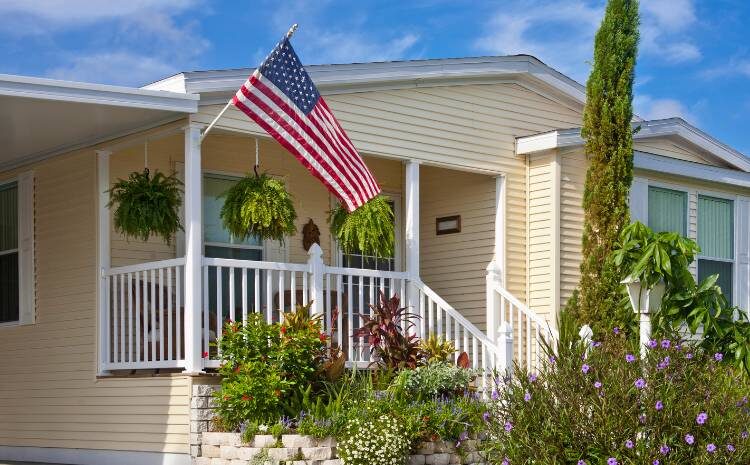
Manufactured homes have come a long way since their inception in 1976.
The evolution of manufactured homes has been remarkable since their inception in 1976, marked by the U.S. Department of Housing and Urban Development’s establishment of new building codes for mobile homes. These codes introduced federal standards encompassing factors like electrical safety, material durability, HVAC performance, and energy efficiency.
Despite the advancements in these standards, manufactured homes still present distinctive risks not encountered in traditional or foundation-built homes. This divergence necessitates a nuanced approach to securing insurance coverage for mobile and manufactured homes, demanding a comprehensive understanding of the pertinent considerations.
Within this guide, we provide an all-encompassing exploration of the insurance requirements for both mobile and manufactured homes. Delving into the specifics, we cover the essential insurance components for these homes, detail the scope of coverage, estimate potential costs, and elucidate additional coverage considerations.
Exploring Mobile and Manufactured Home Insurance
The coverage needs of mobile and manufactured homes cannot be met through a conventional homeowners policy. These prefabricated dwellings possess unique structural characteristics that render them more susceptible to the impact of natural disasters, thereby elevating their insurance risk.
However, the insurance landscape for mobile homes closely mirrors that of traditional homeowners insurance. Both categories offer protection for the dwelling, personal property, and liability. A noteworthy distinction arises in the fact that mobile homes are not legally mandated to be insured.
Nonetheless, the decision to forego coverage should be weighed carefully, as numerous mortgage companies and mobile home communities mandate proof of insurance. Moreover, considering that the average cost of a manufactured home in the United States is approximately $88,200, the absence of coverage could entail substantial financial exposure.
Comprehending the Elements of a Mobile and Manufactured Home Policy
As individuals navigate the process of acquiring insurance coverage for mobile and manufactured homes, it becomes imperative to grasp the components incorporated within a basic policy. The subsequent sections delineate the most prevalent coverages found in such policies.
Property Coverage:
Parallel to homeowners insurance, insurance tailored for mobile and manufactured homes furnishes protection against damage incurred by the physical structure. Incidences like hail damage to the roof or vandalism-induced window breakage fall within the ambit of coverage.
The majority of policies extend coverage up to the prescribed policy limits in the event of damage stemming from fire, smoke, wind, rain, explosions, vandalism, or lightning. This form of coverage, often referred to as dwelling coverage, extends to attached structures on the property. Consequently, decks, porches, or steps affixed to the home are encompassed within the dwelling coverage.
Safeguarding Personal Possessions:
The susceptibility of mobile and manufactured homes to environmental and natural calamities necessitates protection against perils such as fire and high winds. As elucidated previously, these insurance policies extend coverage to safeguard against these catastrophic events. Furthermore, if personal belongings within the premises sustain damage due to specified catastrophes—such as a fire damaging an oven—the policy offers reimbursement up to a predetermined threshold.
In scenarios where valuable possessions are at stake, prudent individuals are advised to procure supplementary coverage—a subject that will be explored later in this guide.
Liability Protection:
Contemplate a scenario characterized by the worst-case outcome—your neighbor visits, slips, and sustains injuries on the steps leading to your home. This unfortunate turn of events culminates in significant medical and legal expenses. The absence of suitable insurance renders you accountable for these costs. However, a mobile and manufactured home insurance policy assumes responsibility for the neighbor’s expenses, in addition to the associated damages and legal fees.
It’s noteworthy that liability coverage does not extend to household members. If, for instance, you were to encounter a slip and fall incident on your own steps, the mobile home insurance policy would not extend coverage for your medical bills.
Loss of Use and Additional Living Expenses:
This category of coverage comes into play when the dwelling sustains damage to an extent that renders it uninhabitable. In situations demanding temporary residence elsewhere, this coverage facilitates reimbursement—subject to meeting the deductible—for expenditures on lodging and meals. A classic illustration entails a scenario where the home is damaged by fire, necessitating temporary accommodation in a hotel during the repair process. Depending on the policy’s deductible and coverage limits, insurance coverage mitigates the costs associated with both the interim stay and home restoration.
Exclusions from Mobile and Manufactured Home Insurance:
Certain events and circumstances are excluded from basic insurance policies tailored for mobile and manufactured homes. Although specifics can vary contingent upon the insurance plan and provider, the ensuing events are typically omitted from coverage:
Floods: Consequent water damage stemming from flooding remains outside the purview of a standard insurance policy. Nonetheless, if water damage is triggered by internal factors such as a burst pipe or an overflowing toilet, the mobile home insurance policy might encompass the damages.
Earthquakes: Standard insurance does not extend to damage or losses inflicted by earthquakes. This encompasses seismic events, including those linked to volcanic activity, occurring within 72 hours of an earthquake. While certain insurers might cover fire damage resulting from an earthquake, it’s prudent to consult an agent to ascertain coverage, particularly if residing in an earthquake-prone zone.
Hurricanes: In regions susceptible to hurricanes, supplementary endorsements are required to safeguard against hurricane-induced damage. While typical policies might incorporate wind damage coverage, individuals residing in coastal states necessitate supplementary coverage encompassing both flood and windstorm damage.
Mold: Analogous to water damage engendered by flooding, mold-related damage remains excluded from coverage. Given the potential health hazards associated with mold, prompt remediation is advised upon its discovery.
If you have questions on what is or is not covered with mobile home insurance, contact us today and one of our agents will be able to answer specific questions about your property and help safeguard your belongings.



